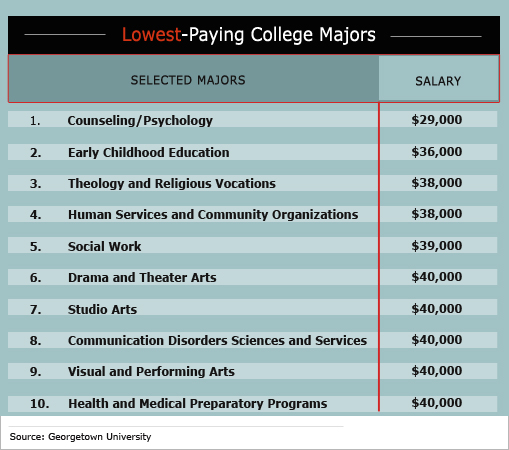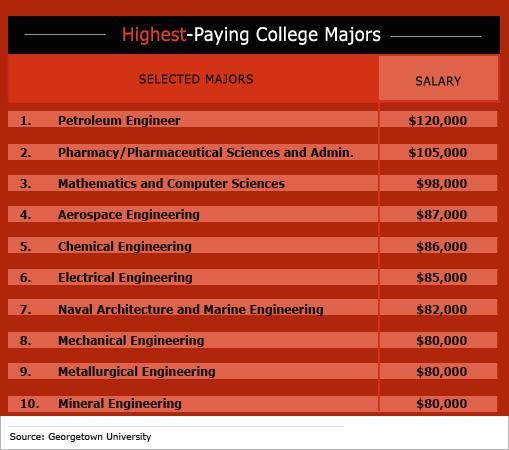Any college degree may be better than no degree, but not all majors are created equal. Those are the results of a report out today on the economic value of college majors from Georgetown University’s Center on Education. The study uses 2009 Census data to analyze the economic impact of 171 undergraduate majors. The highest-paying majors earn 314 percent more at the median than those with the lowest-paying majors.
The median salary for a full-time employee with a major in petroleum engineering is $120,000, compared with just $29,000 for a psychology major. Other highly-paid majors include pharmacy sciences, math and computer science, and a variety of engineering majors. Among the lowest-paying: early childhood education, theology, community organization, social work and theater arts.

Even more startling, there are still significant gender and race gaps when it comes to pay. For example, women with chemical engineering degrees—one of the higher paying fields—still earn on average $20,000 less per year than men with the same degree.
Women tend to hold the majority of degrees in the lowest-paying fields, such as education, the study found. The largest concentrations of women are in health (85 percent) education (77 percent) and psychology and social work (74 percent). Men make up the majority of workers with the highest-earning majors, including engineering (84 percent), and agriculture and natural resources (70 percent). Women with a pharmacy sciences degree earn the most at $100,000.

Like women racial groups tend to cluster in certain majors, and a pay gap persists. But even African-Americans with a major in electrical engineering earn $22,000 less per year than Whites, and $12,000 less than Asians with the same major.
With the unemployment rate at 9 percent and intense competition for jobs there are some fields with virtually no unemployment: geological and geophysical engineering, military technologies, pharmacology and school student counseling. Majors with the highest unemployment rates include: social psychology (16 percent) nuclear engineering (11 percent), education administration and supervision (11 percent).
And even though a growing number of college graduates are questioning the value of their degrees, on average a full time, full year worker with a bachelor’s degree earns 84 percent more over a lifetime than their high-school counterparts, the study found. “The bottom line is that getting a degree matters, but what you take matters more,” said Anthony Carnevale, the Center’s Director.


